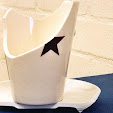Ross Lydall:
Anish Kapoor's mirror sculptures in Kensington Gardens have been given 24-hour security costing the taxpayer an estimated £120,000.
For the next six month guards will stand beside stainless steel structures. Passers-by are being told not to touch or get too close. Dog-walkers must keep pets on leads to prevent them putting paw marks on the polished surfaces.
The public is not allowed to step on the plinth of one piece, C-Curve, to get the full effect of the huge concave mirror - unlike Kapoor when he unveiled the exhibition, Turning The World Upside Down, last week.
The security, present even when the park is shut, has been criticised as heavy-handed and detracting from the art. Kapoor wants to reflect the beauty of the "properly democratic" park's landscape and the sky, but many views are marred by guards' high-visibility jackets. Royal Parks is considering issuing them in "more subtle" colours. Officers are present even though one of the four sculptures - Sky Mirror, Red - is in the Round Pond, while another, Sky Mirror, is behind a steel fence.
The bill is being picked up by the Royal Parks Agency, a quango that gets £19 million a year in public funding. It refused to reveal the exact cost, claiming commercial confidentiality. But conservative estimates put it at more than £120,000 for the six months.
When two of the pieces were exhibited in Brighton last year, Kapoor wrote to the council with instructions on security. Artist Mocksim, who protested over the Brighton show, said art objects were rarely vandalised, "but ... if someone urinated in Marcel Duchamp's urinal in Tate Modern, that can be something you allow as a venting off.
"It seems rather pompous. This is the world we now live in - to show something is important you put a bunch of heavies around it." Audrey Simpson, who visited the sculptures, said she complained security was excessive compared with Brighton and a guard told her: "Brighton is not London."
A spokesman for the Serpentine Gallery, which is staging the exhibition with Royal Parks, said they had a "duty of care" to ensure the works' safety: "It is vital to ensure visitors can view it in its optimum condition. The main role of the security is to prevent impact from the many dogs in the park, as even light contact can damage their surface. The reflective surfaces have been achieved through many hours of polishing."
A Royal Parks spokeswoman said the five guards would be reduced to two at quieter times.
Thursday, 7 October 2010
Subscribe to:
Post Comments (Atom)


No comments:
Post a Comment